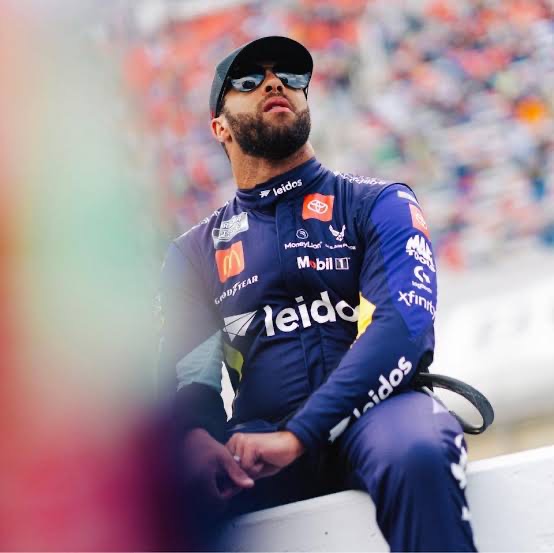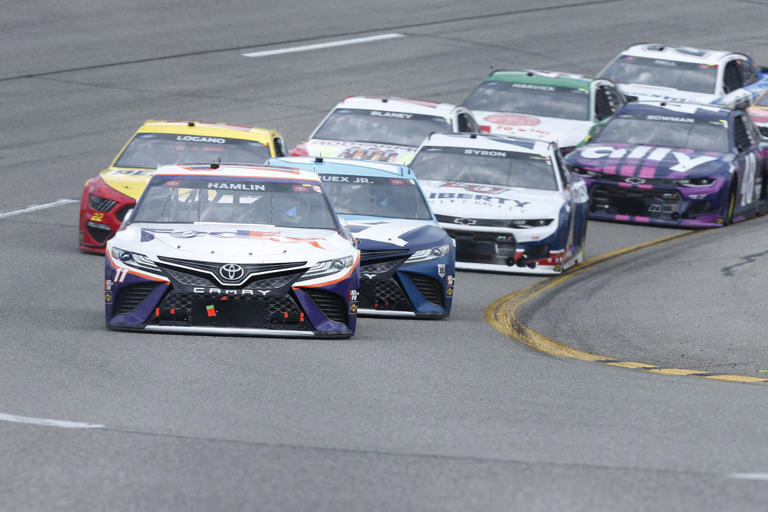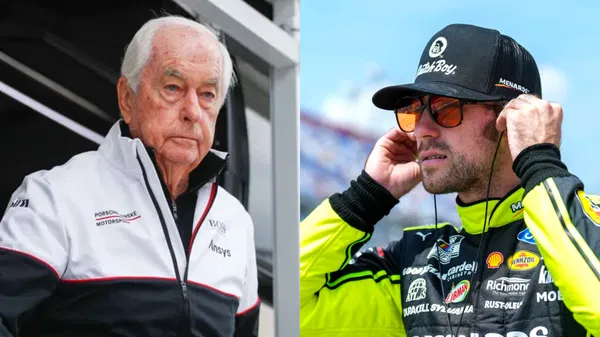In today’s social media-driven world, public figures are constantly under a microscope, with every action or comment open to criticism from all angles. Bubba Wallace, one of the most polarizing figures in NASCAR, faces this reality daily. As a Black driver in a historically white-dominated sport, Wallace has been both praised for his courage and activism and vilified by a subset of fans who either disagree with his stance or simply don’t like him. Recently, a comment circulating on social media posed a question that cuts deep: “Wonder how Bubba gonna explain to his kid why he is so hated? I’m sure he will use his race card!” This comment touches on the intersections of race, legacy, and the burden Wallace will carry as he raises the next generation.
While the remark is a direct reflection of the tension surrounding Wallace’s presence and advocacy in NASCAR, it also opens the door to a broader conversation: How will Bubba Wallace address the complexities of his career and the challenges of being an African American in a sport still grappling with its own history? How will he, as a father, teach his child about the dynamics of race, activism, and the hate he has endured?
The Complexity of Being Bubba Wallace
Before diving into the idea of how Wallace will explain his career to his child, it’s important to understand the complexity of his position. Bubba Wallace isn’t just another NASCAR driver trying to make his mark; he’s someone who has been thrust into the spotlight as a representative of change in a sport that has deep Southern roots and a predominantly white fanbase.
In 2020, Wallace became the face of NASCAR’s push for diversity when he called for the banning of the Confederate flag at racetracks. This act, coupled with his public stance on racial justice, made him a hero to many but also painted a target on his back. He became a lightning rod for those who felt his activism was unwelcome in NASCAR, a space some wanted to remain free of social and political debates.
This is where the conversation becomes challenging. Wallace’s race is not a “card” to be played—it’s a part of his identity that shapes how he experiences the world and the sport. The criticism he faces isn’t just about his performance on the track; it’s deeply intertwined with how some fans feel about race in America. For Wallace, explaining his career and the backlash he’s faced is going to be more than just talking about wins and losses—it will involve discussing the societal forces at play.
Explaining the Hate
So how will Bubba Wallace explain to his future child why he is so hated by some? First and foremost, Wallace will likely frame it in the context of resilience and standing up for what he believes is right. Wallace didn’t ask to be a symbol for change, but when the opportunity arose, he embraced it. He knew there would be backlash, but he pushed forward anyway, because to him, making the sport more inclusive was worth the personal cost.
He will explain that, in life, when you stand for something—especially something controversial—there will always be people who push back. For Bubba Wallace, the backlash isn’t just about him personally; it’s about what he represents. His child will learn that many people don’t like change, especially when it challenges their comfort zones and long-held traditions. But Wallace’s actions weren’t just for him; they were for the future, for a sport where diversity and inclusivity would eventually become the norm.
The “Race Card” Myth
The idea that Wallace would use his race as an excuse is a common critique thrown at him by detractors, but this comment reflects a misunderstanding of what Wallace has faced. Calling attention to racism or injustice isn’t playing a “card”—it’s addressing a reality that millions of people, including Wallace, experience every day.
In explaining this to his child, Wallace will likely highlight the importance of being truthful and authentic about one’s experiences. He’ll explain that race does matter, not because he chooses to make it an issue, but because society often does. He will teach his child that while they might encounter people who minimize or dismiss these issues, it’s essential to speak out against injustice and to stand firm in one’s beliefs.
Teaching Resilience and Pride
At the heart of Wallace’s future conversation with his child will be a lesson in resilience. Bubba Wallace didn’t quit NASCAR when the going got tough. He didn’t back down in the face of hatred, online trolls, or even physical threats. Instead, he persevered, showing that the true measure of a person isn’t how many times they get knocked down but how many times they get back up.
His child will learn about the power of self-belief and the importance of fighting for what’s right, even when it’s unpopular. They’ll hear about how their father wasn’t afraid to be different and how he stood tall, not just as a driver but as an advocate for a better, more inclusive future in NASCAR.
Looking to the Future
For Bubba Wallace, his legacy isn’t just about race wins or playoff appearances. His legacy is about breaking barriers, challenging norms, and pushing NASCAR to be better. As he eventually shares his story with his child, he’ll not only explain the hate he’s received but also the love and support he’s garnered from those who believe in his mission.
He will also likely discuss how far NASCAR has come and how much work still remains. Wallace’s story is one of progress but also of the ongoing challenges that come with being a trailblazer. He will ensure his child knows that hate isn’t something to be feared but something to be confronted with dignity and determination.
Conclusion: A Legacy of Courage
In the end, Bubba Wallace’s future conversations with his child won’t be about “playing a race card.” They’ll be about the importance of standing up for what you believe in, even when it’s difficult. They’ll be about resilience in the face of hate and criticism. And perhaps most importantly, they’ll be about leaving a legacy that’s bigger than just one person.
Wallace’s story is still being written, but one thing is certain: his child will grow up knowing their father wasn’t afraid to be bold, to push for change, and to take the criticism that came with it. That’s a lesson worth passing down for generations to come.




